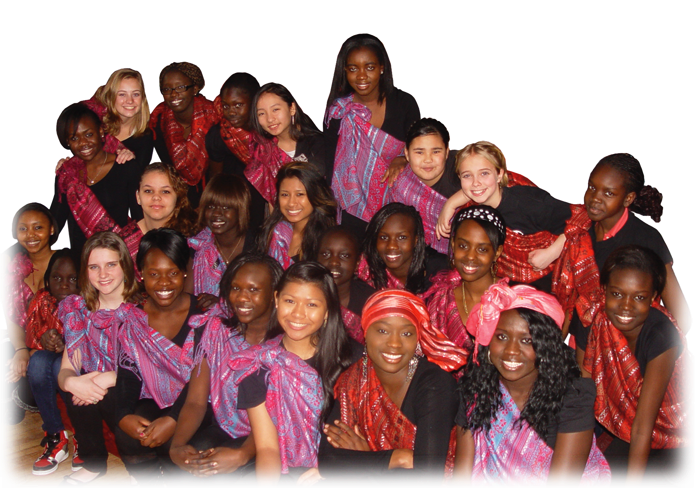Home Frank’s Blog Music and Diplomacy
Music and Diplomacy
Frank Fitzpatrick 09/27/2012

|
No time to read? Pick your language & press PLAY
Getting your Trinity Audio player ready...
|
WHY MUSIC – Part 3: Music and Diplomacy
“For every word intended to render us deaf to one another, there is always a lyric connecting ears and hearts across the continents in rhyme.” – Sarah Jones
Judith was a beautiful sixteen-year-old Sudanese girl living in Portland, Maine, who, as a younger child and in the arms of her pregnant mother, narrowly escaped the horrors of her war-torn homeland. I’ll never forget that Sunday afternoon when Judith shared her dreams for a more peaceful world and sang for me as a proud member of Pichintu, a multicultural children’s choir comprised of thirty-five teenage girls  (mostly adopted orphans and refugees) from seventeen different countries. I recorded the group as part of a campaign for the United Nations Special Rapporteur on Disability to raise awareness of the effect of weapons of war and the growing handicapped population in the Middle East. Collaborating with one of the leading Arabic-speaking hip hop artists, a highly educated and socially outspoken MC from Lebanon named Rayess Bek, we created a bilingual song and music video called “Just Like You.”
(mostly adopted orphans and refugees) from seventeen different countries. I recorded the group as part of a campaign for the United Nations Special Rapporteur on Disability to raise awareness of the effect of weapons of war and the growing handicapped population in the Middle East. Collaborating with one of the leading Arabic-speaking hip hop artists, a highly educated and socially outspoken MC from Lebanon named Rayess Bek, we created a bilingual song and music video called “Just Like You.”
 Our collective goal was to reach millions of young people across several Arab-speaking countries and help break down some of the stereotypes and misunderstandings that far too often lead to unnecessary violence and cultural divides. We hoped that if people of different cultures could look at each other through the eyes of their children and recognize these same underlying qualities in all children around the world, mutual compassion for one another would increase, leaving us less inclined to view those unseen and misunderstood as the enemy.
Our collective goal was to reach millions of young people across several Arab-speaking countries and help break down some of the stereotypes and misunderstandings that far too often lead to unnecessary violence and cultural divides. We hoped that if people of different cultures could look at each other through the eyes of their children and recognize these same underlying qualities in all children around the world, mutual compassion for one another would increase, leaving us less inclined to view those unseen and misunderstood as the enemy.
During a television interview following the recording, the show’s host asked me this essential question: “In a region wrought with a history of so much war and hatred, can a song really make a difference?”
 My response was, “If music can’t make a difference, I don’t know what can.”
My response was, “If music can’t make a difference, I don’t know what can.”
The truth is, there have been countless incidents where music has helped cultivate more empathetic relationships between cultures and bridge social and political divides. Whether it was the U.S. State Department dispatching prominent jazz musicians abroad during the Cold War to counter Soviet propaganda about life in America, Michael Jackson and other pop stars uniting for Africa with “We Are The World,” or musicians from around the world playing together on a Bob Marley recording through Playing For Change; music has the power to build bridges and awaken people’s hearts when nothing else can. When it comes to the power of song to carry a message deep into the hearts and minds of mankind, I turn again to the words of author and minister Henry Giles: “A song will outlive all sermon in the memory”.
Judith’s choir was far more than a gathering of teenage girls coming together to have fun making music. With young delegates from 17 countries – each with a different history of trauma, separation and isolation; each from a completely different set of cultural beliefs, languages and traditions – joining hands, hearts and voices to work together in literal harmony, it was a microcosm of the world at large and a true validation of how music can unite and transform us.
 I was again reminded of the power of music as a unifying force at a recent event at the Kennedy Center in Washington, D.C. The Thelonious Monk Institute’s star-studded “Women, Music and Diplomacy” Gala, honoring the first female U.S. Secretary of State, Madeleine Albright, brought together diplomats and political leaders with over a dozen jazz legends (including Herbie Hancock, Wayne Shorter and Jimmy Heath) and pop icons (including the Queen of Soul Aretha Franklin) to celebrate the critical role of music and women in diplomatic relations around the world.
I was again reminded of the power of music as a unifying force at a recent event at the Kennedy Center in Washington, D.C. The Thelonious Monk Institute’s star-studded “Women, Music and Diplomacy” Gala, honoring the first female U.S. Secretary of State, Madeleine Albright, brought together diplomats and political leaders with over a dozen jazz legends (including Herbie Hancock, Wayne Shorter and Jimmy Heath) and pop icons (including the Queen of Soul Aretha Franklin) to celebrate the critical role of music and women in diplomatic relations around the world.
Like our teenage diplomats in the choir, Madame Albright’s life was forever changed when, at the tender age of 12, the Nazis invaded her hometown in Czechoslovakia. Later appointed by President Bill Clinton to the United Nations and Secretary of State, she spoke of how music was often key to breaking the ice in diplomatic relationships. As an example, she shared the story of bringing Czech President Vaclav Havel, a former dissident, together with Clinton at a jazz club in Prague, where Havel presented a saxophone as a gift to the president, who in turned performed “My Funny Valentine” on his new sax with Havel accompanying on maracas.
 In the spirit of the evening at the Kennedy Center, Secretary Albright took her place behind the drums while Chris Botti and George Duke lead a moving rendition of Puccini’s soul-stirring aria “Nessun Dorma.”
In the spirit of the evening at the Kennedy Center, Secretary Albright took her place behind the drums while Chris Botti and George Duke lead a moving rendition of Puccini’s soul-stirring aria “Nessun Dorma.”
Many of the world’s most memorable and effective leaders of social change, as well as advocates for improving human relations and conditions for those without voice, were and still are musical artists. Musical ambassadors play a key role at keeping the world on track, even in the most turbulent of times. Can you imagine what the world would look like today without the music and presence of artists like Bob Marley, Fela Kuti or John Lennon?
Beyond that, can you imagine your own life – the way you find your peace of mind, celebrate time with others, or connect to the world around you – without music? More than a great tool for diplomacy, music is the connective tissue at the heart of humanity.
[youtube]http://www.youtube.com/watch?v=fgWFxFg7-GU[/youtube]
View this article on Huffington Post.
To view the full Why Music series click here.
I’m here to help YOU create a better world, inside and out.
Contact Me© 2025 Frank Fitzpatrick Website by AllHereIndia












